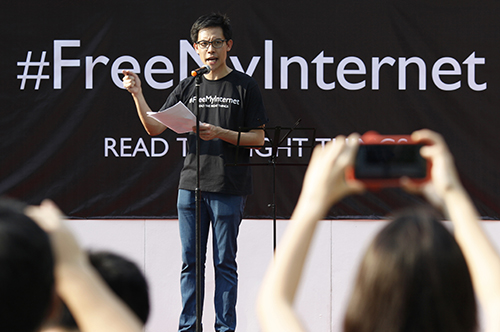“If we want our freedom, we have to fight for it,” wrote blogger Roy Ngerng last year after he was sued for defamation by Singapore’s prime minister. The case was sparked by a blog post in which Ngerng allegedly suggested Prime Minister Lee Hsien Loong had misappropriated funds in a state pension system. In November, the court ruled in favor of the prime minister.
A court will be assessing damages on July 1-3. But the blogger is worried that the damages, which will be announced after the hearings, will deal him a financial blow from which he may not be able to recover.
“When the damages come, it is likely that I would be made bankrupt,” Ngerng told CPJ. “For me, it has been an enduring time of ups and downs, sometimes of hope and sometimes of dismay, at why your writing does not garner and harness the effect that it has [as in other places]. I do at times feel helpless and lost as to what I should do.”
In past instances, damages awarded to government officials in such cases have been deeply punitive, frequently resulting in financial devastation for those sued, according to news reports. Ngerng has already paid Singaporean $70,000 (about US$52,500) in lawyer’s fees, he told CPJ, along with Singaporean $29,000 (about US$22,000) in legal costs that he was ordered to pay to Lee earlier this year. The blogger used crowdfunding efforts to help overcome the costs.
Such legal actions appear intended to inflict maximum damage on a critic. The prime minister filed the suit in Singapore’s High Court, which oversees cases involving claims greater than Singaporean $250,000 (about US$187,000), Ngerng told CPJ. Last year, Lee rejected an offer from the blogger for damages amounting to Singaporean $5,000 (about US$3,800), dismissing the offer as “derisory,” news reports said.
Most of Singapore’s media are directly or indirectly controlled by the government, and self-censorship is rife. As such, bloggers have played a vital role in a place where independent journalism is frequently stifled. Those who do work independently know to curtail criticism of the government lest they be sued for defamation. Under Singapore’s Defamation Act and penal code, the offense is punishable by up to two years in prison, or a fine, or both. Singapore officials have frequently invoked contempt and defamation charges against journalists, and have won substantial settlements, fines, and damages from The New York Times, Bloomberg, The Economist, and The Wall Street Journal and its parent company Dow Jones, CPJ research shows.
This year, authorities arrested teenage blogger Amos Yee in connection with an eight-minute video in which he criticized the late Lee Kuan Yew, the founder of modern Singapore who ruled the city-state for more than three decades and was father to the current prime minister. Yee was convicted of disparaging Christians in a YouTube video and of disseminating an obscene image, news reports said. Today, a court ordered that he be held at a mental facility for two weeks pending a psychological assessment.
While bloggers like Yee may have thought that Lee Kuan Yew’s death in March could present an opportunity for the country to turn over a new leaf, it appears little has changed.
Ngerng, pointing to authorities’ heavy-handed response to Yee’s video along with the shutdown in May of the independent news website The Real Singapore, told CPJ conditions seem to be worsening and could further deteriorate in the lead-up to the general election, which some political analysts say may take place by the end of the year, well ahead of the 2017 deadline.
Yet the blogger appears determined to continue his battle. “Nonetheless, we will fight. I believe that I am fighting in the interest of the public. We cannot bow down to the threats that face us. We have to confront them in the face and force the aggressor to back down, so that the people can regain their rights.
“In the end, there is no doubt that I will be financially ruined, but my aim is still the hope that Singaporeans will be aware of what is going on in Singapore, so that they will vote for a government that will at least be able to turn things around,” Ngerng said.
